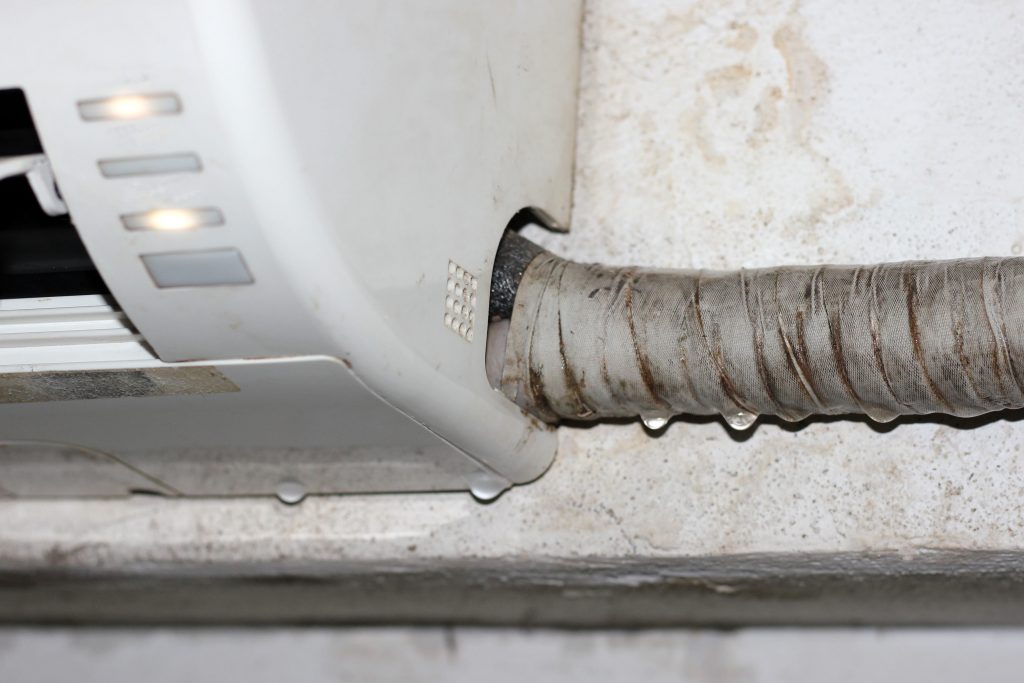Air conditioning systems play a vital role in keeping our homes comfortable, especially during the scorching summer months. However, encountering water leakage issues with your A/C unit can be a cause for concern. In this article, we’ll explore the common reasons why your A/C might be leaking water and provide practical solutions to address the issue.
Clogged Drain Line
Cause: Over time, dirt, dust, and debris can accumulate in the A/C’s drain line, leading to blockages. When the drain line is clogged, water backs up and can overflow from the A/C unit.
Solution: Clearing the drain line is essential to prevent water leakage. This can be done by using a wet/dry vacuum to suction out the blockage or by flushing the line with a mixture of water and vinegar. Regular maintenance and cleaning of the drain line can help prevent future clogs.

Dirty Air Filter
Cause: Excess water leaks from the unit as a result of the evaporator coil freezing and then thawing due to an unclean or clogged air filter that inhibits airflow.
Solution: Depending on usage and type, the air filter should be cleaned or replaced on a regular basis, usually every one to three months. This simple maintenance task improves airflow, reduces strain on the system, and helps prevent water leakage.
Frozen Evaporator Coil
Cause: Poor airflow or refrigerant issues can cause the evaporator coil to freeze. When the coil thaws, it can produce excess water that leaks from the A/C unit.
Solution: Turn off the A/C system to allow the evaporator coil to thaw completely. Once thawed, check for any airflow restrictions, such as blocked vents or dirty filters, and address any refrigerant issues by contacting a professional HVAC technician.
Damaged or Disconnected Drain Pan
Cause: The drain pan, located beneath the evaporator coil, collects condensate water and directs it to the drain line. Water leaks from the air conditioning unit might occur if the drain pan is broken, fractured, or placed incorrectly.
Solution: Inspect the drain pan for any signs of damage or misalignment. Repair or replace the drain pan as needed to ensure proper water drainage from the A/C unit.
Improper Installation or Slope

Cause: If the A/C unit is not installed correctly or is not properly leveled, water may not drain correctly from the unit, leading to leakage issues.
Solution: Have a professional HVAC technician inspect the installation of your A/C unit to ensure it is properly leveled and sloped for effective water drainage. Making adjustments as necessary can help prevent future water leakage problems.
High Humidity Levels
Cause: In areas with high humidity, condensation can accumulate more quickly on the A/C unit’s evaporator coil, overflow from the drain pan, and result in water leakage.
Solution: Consider using a dehumidifier in conjunction with your A/C system to help reduce indoor humidity levels. Additionally, maintaining proper airflow and regular A/C maintenance can mitigate the effects of high humidity on water leakage.
Conclusion
Your air conditioning unit leaking water can be a very annoying and even dangerous problem. By understanding the common causes of A/C water leakage and implementing proactive maintenance measures, you can effectively troubleshoot and address the problem. Regular inspection, cleaning, and maintenance of your A/C system, along with professional assistance when needed, are essential steps in ensuring the efficient and reliable operation of your cooling system. It is also important to hire an expert for your Las Vegas AC repair service for your convenience and to make sure that the problems will be addressed properly.






